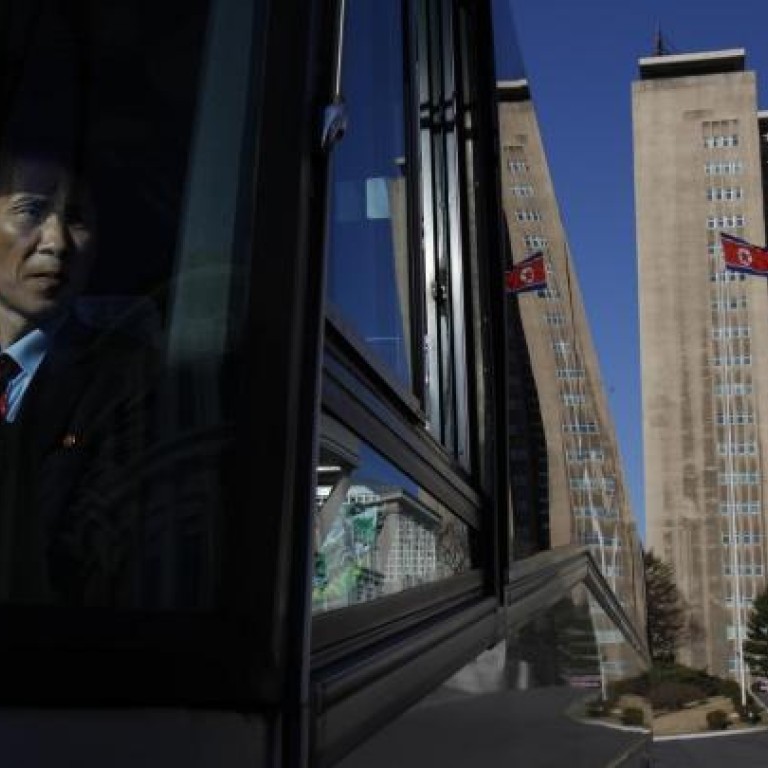
North Korea's 'industrial hub' open for business but sees few takers
Pyongyang's economic dreams remain a faraway fantasy as special zone set up to lure Chinese investors fails to attract
A lonely farmer and his ox cart are the only sign of activity on a dusty island meant to be an industrial hub that will raise North Korea's wrecked economy.

And while the government is hoping to lure in foreign investment, more often than not, the money, and tens of thousands of workers, are heading out of the impoverished North instead.
The 1,400-hectare Hwanggumphyong island is one of four economic zones that were designed to be a magnet for Chinese capital and manufacturing.
It lies on the Yalu river, across from the bustling Chinese border city of Dandong and one of the few areas where North Korea allows its citizens contact with the outside world.
But Chinese investors are showing little appetite for North Korea, whose economy is worse than it was 20 years ago from a combination of sanctions over its nuclear weapons ambitions, famine and mismanagement.
"We Chinese would like to go to North Korea to invest because they have space for business. But policies are not stable, so we dare not invest there," said trader Zheng Qiwei from the Chinese coastal province of Zhejiang , far from North Korea.
This year, a multimillion-dollar deal to refine North Korean iron ore by China's Xiyang Group soured as officials shook down the Chinese investor. Xiyang went public with its complaints, triggering a furious response from the North.
Hwanggumphyong was launched last year with great fanfare by Jang Song-thaek - the uncle of Kim Jong-un, North Korea's young ruler who is only in his twenties - with a pledge of tax breaks and repatriation of dividends, hoping to emulate a formula that has worked for economic zones the world over. But for the moment, it remains little more than a small, boggy island.
Many analysts say the North Korean leadership is terrified that reforms could weaken its iron grip on the state, and it has repeatedly balked at any sweeping changes, ignoring pressure from China, its only real ally, to emerge from its self-imposed cocoon.
Any improvement in living standards in one of the world's poorest countries - UN data shows a third of the children in North Korea are malnourished - looks to be almost entirely focused on the capital, Pyongyang, home to the elite which keep the Kim family in power.
"Pyongyang is a different planet," said a 35 year-old Chinese trader who lived in a small town in North Korea for more than 25 years and still regularly returns to visit, most recently several months ago.
North Korea restricts travel within the country, and the authorities make it extremely difficult for any but the chosen to live in the capital, the trader said.
The rise in Pyongyang's living standard may also have something to do with the more open style of the new, young leader Kim, a far cry from the dour image his father cultivated.
"Ladies from Pyongyang now dress differently. There are no more plain clothes, and they are more animated," said an ethnic Korean Chinese whose family runs a restaurant in Dandong.
Some who cross the border have even given up wearing the mandatory lapel badge picturing Kim Il-sung, North Korea's founder and grandfather of the current ruler, a break with style that could land them in a labour camp in their homeland.
The young Kim, who took power in North Korea after his father's death of his father last December, appears to have reinforced policies to bolster fortunes of the capital, which is home to more than 3 million people, or about 12 per cent of the population.
It has been dubbed the "Republic of Pyongyang" by outsiders, thanks to the relatively lavish perks given to its residents in the form of theme parks, new apartments and renovations .
The plump Kim has been shown riding a roller coaster and eating popcorn at a high-end restaurant in Pyongyang. His wife, Ri Sol-ju, has a penchant for Dior designer bags .
"In the past, people couldn't feel the gap between the rich and the poor because of state control," said the Chinese trader who sometimes sells clothes to North Koreans. "But since that control is loosening up, the gap between those who have and those who don't is widening."
According to Seoul-based advocacy groups, about 60,000 to 70,000 North Koreans sell their labour outside the country, working in factories in China, logging camps in Siberia and construction sites in the Middle East.
Some choose a more direct route to escape the North's poverty where annual gross domestic product per capita is estimated to be just $1,800.
A middleman in Shenyang has seen women choosing to be sold into marriage in China, or to work in brothels.
"They want to flee home, but there's no other way than to be sold in a form of marriage," said the Korean-speaking man who requested anonymity for his safety. "One person is worth 10,000 yuan to 12,000 yuan."
